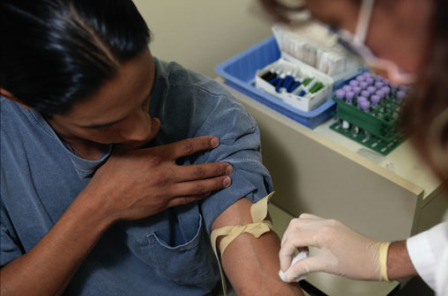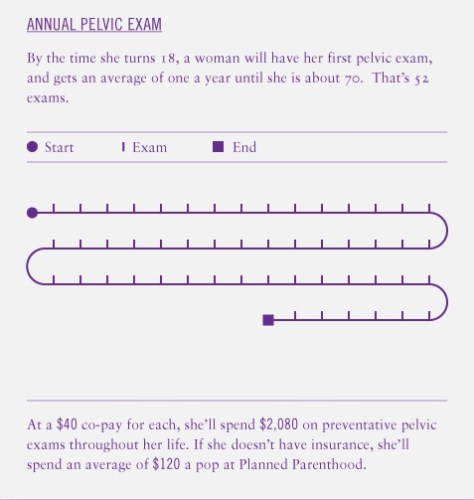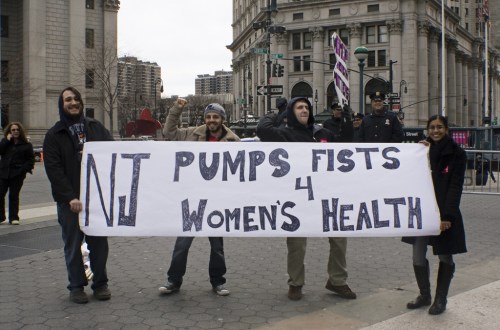Being a woman is expensive. And that’s n0t even including Bloomingdale’s. For the “average” woman in America, staying healthy is a challenge that exhausts both our resources and our patience. If there’s anything more annoying than passing out at the blood test facility and waking up without a slice of pizza in the vicinity, it’s trying to pay for the blood test in the first place.
The fact that healthcare is so hard to afford for a group that still makes 75% less than men has consequences. Currently, the high costs of being a woman interfere with tons of lives, women’s and otherwise. It affects whole families! It means someone in a household is probably not being taken care of as well as they could be, and often the person (woman) not receiving adequate healthcare or having to use all her resources to obtain that healthcare is supposed to also be responsible for the health and wellbeing of everyone else in the household. Sometimes, it means women are literally struggling to survive. Which is precisely why the Institute of Medicine was totally in the right last week when they recommended in their yearly report that women finally not be left alone to cover the costs of their health.
So how much does a woman cost? Well. GOOD Magazine “took stock of the money spent by a “typical” American woman whose sexual health and life choices correlated with the national averages” and made it look very pretty so we could find out. It features the eight preventative services that the Institute of Medicine has declared women should be able to access free of charge, and determined how much they would cost with and without insurance. Definitely click through to view the full infographic, but here’s an example:
More specifically, the experts at the Institute of Medicine said:
“The full range of FDA-approved contraception, yearly well-woman visits, support for breast feeding, counseling for sexually transmitted infections, and screening and counseling for domestic violence are essential women’s preventive health services and should be covered by health insurers with no co-pays… The eight services we identified are necessary to support women’s optimal health and well-being. Each recommendation stands on a foundation of evidence supporting its effectiveness,” Linda Rosenstock, dean of the School of Public Health at UCLA, who chaired the panel, said in a statement.
Their recommendation included the following care:
+ screening for gestational diabetes
+ HPV testing as part of cervical cancer screening for women over 30
+ counseling on sexually transmitted infections
+ counseling and screening for HIV
+ contraceptive methods and counseling to prevent unintended pregnancies
+ lactation counseling and equipment to promote breast-feeding
+ screening and counseling to detect and prevent interpersonal and domestic violence
+ yearly well-woman preventive care visits to obtain recommended preventive services
The Affordable Care Act requires that preventive health services be covered by insurance plans without out-of-pocket expenses. The services are identified by the Department of Health & Human Services, managed by Secretary Kathleen Sebelius. This recommendation is not necessarily the end point – but it’s a strong starting one. The recommended procedures, if included in the act, would promote women’s health and save women’s lives.
It is a pretty safe guess that Sebelius will take on the recommendations and work to incorporate them into the DHHS preventive care list. And that means it’s a pretty safe guess that women will no longer have to wait in doctor’s offices wondering how to pay the bills. Or where the pizza is.
There will surely be opposition, however, about the recommendations – based mostly around the idea that contraception be covered as well. Women’s groups like NARAL are preparing for that challenge. And it’s also worth mentioning that even assuming these changes can be made, we’re not likely to actually see them in action until sometime in 2012. In the meantime, though, it’s worth celebrating that the Institute of Medicine acknowledges women exist, and should be treated like equals by insurance companies.
Senator Barbara Mikulski got it right when she said:
“Today’s IOM report means we are one step closer to saying good-bye to an era when simply being a woman is treated as a preexisting condition. We are saying hello to an era where decisions about preventive care and screenings are made by a woman and her doctor—not by an insurance company, members of Congress, or a stranger—and women are guaranteed preventive screenings and care with no additional co-pays or deductibles.”




I think this is a great first step, but I’m troubled that it’s all about reproductive health. I recently got a government sponsored insurance specifically for women- but it only covers reproductive health services, because clearly that is the only part of a woman’s health worth insuring.
Meanwhile I can’t go to a GP if I have the flu. We still have a long way to go.
I agree that we have a long way to go–and that all healthcare should be easily affordable/accessible to all, but I think the point here is that preventative reproductive healthcare services are the ones that are additional burdens on women. So… because they are necessary for women’s health, specifically and in addition to the care that all people require, their high cost causes inequality in access.
But yeah. It would be great if all preventative healthcare and well visits were free for everyone. I mean, then there would be less money spent treating sick patients? Maybe? Also: screening and counseling for sexually transmitted diseases should be free, always, for everybody. The whole copay + copay to the lab I recently paid my doctor pisses me off–because while I’m insured AND can afford the copays, that is not everyone’s situation. And a free HIV test, while lovely, doesn’t cover everything and is often what is available.
*25% less than men? Which is still VERY significant and unfair
Am I understanding this right if I assume that this means women who have insurance can get preventative services, but women without are still stuck?
My mom has never had health insurance and she also hasn’t had a pap smear or a breast since like the early ’80s and I worry about her sometimes.
Was that oversharing? I’m sorry, I come to Autostraddle and suddenly I’m waking up and my feelings are everywhere.
Healthcare initiatives like this are sort of genius but really hard to pass because dissenters claim “We can’t have no-copay contraceptive services because it forces people who morally oppose to pay higher premiums!” What they don’t realize is that if preventative services are more accessible, then people are healthier and healthcare costs drop overall. Equals lower premiums for everyone. Equals celebrations and fist bumps all around.
I just have to say that healthcare pisses me off. I get charged MORE than the average female simply for being a lesbian. They said I live a ‘high-risk’ lifestyle. WTF ever. I am like the most boring down-to-earth lesbian you could find. I don’t smoke, I rarely drink, I don’t have casual sex, I even exercise every fucking day. They didn’t look at my actual health, lifestyle or choices AT ALL. It just pisses me off. That is all.